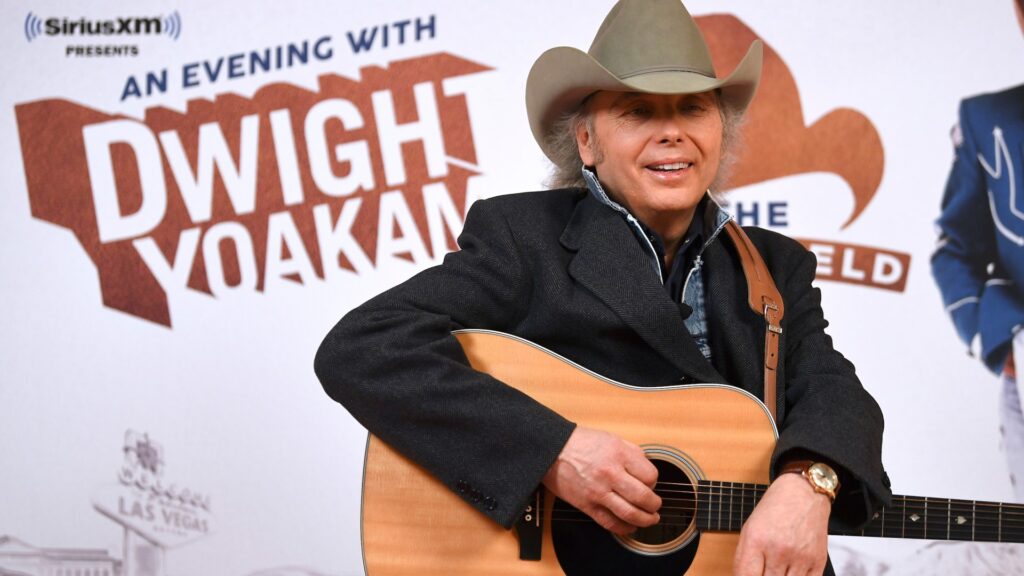
A small-town obituary set to Bakersfield twilight—“Floyd County” is Dwight Yoakam’s quiet eulogy for a good man, and for the way a community learns to bear its losses.
Key facts first. “Floyd County” sits as track nine on side two of Buenas Noches from a Lonely Room, released August 2, 1988 on Reprise. It runs just under three minutes (2:55), was not issued as a single, and lives in the album’s shadow rather than the charts—those headlines went to “Streets of Bakersfield” and “I Sang Dixie,” both U.S. country No. 1s, with “I Got You” rising to No. 5 a few months later. The album itself topped Billboard’s Top Country Albums and reached No. 68 on the Billboard 200.
There’s a lovely bit of backstory tucked into the credits: Yoakam had “Floyd County” in his notebook years earlier. Alongside “I Sang Dixie,” he demoed it in 1981, then held it back until the music—and perhaps his own voice—had the weather to carry it. You can hear that patience in the finished cut; the song feels worn smooth by time, like a pocket coin.
What is the piece about? Yoakam writes like someone who’s stood in the receiving line after the funeral. “Floyd County” “chronicles the death of a man who was a pillar in the community,” but it never shouts that truth; it lets the town tell it—neighbors passing quiet facts between them, grief arriving not with trumpets but with casserole dishes and careful handshakes. That restraint is the song’s ethics as much as its style.
Musically, it’s CCR-influenced Bakersfield more than Nashville gloss: a mid-tempo sway, Telecaster filigree from producer-guitarist Pete Anderson, pedal-steel sighs (Tom Brumley’s fingerprints are all over this album), a pocket as steady as a porch swing. Recorded at Capitol Studios in Hollywood, the sound is warm and unadorned, the kind of clarity that makes you lean forward. In the wider album personnel you’ll see Taras Prodaniuk on bass, Skip Edwards at the piano, and a small circle of players who understood that, for this track, the point was to lift the story rather than decorate it.
Placed inside Buenas Noches from a Lonely Room, the song does more than fill a slot—it changes the air of side two. After the jealous dread and violence etched across side one, and the cold exposures that follow, “Floyd County” arrives like a long breath out, a moment when private pain becomes communal memory. The album has often been described as a dark cycle—adultery, murder, reckoning, a late turn toward faith—and this cut is the scene where the town steadies itself and speaks the deceased back into being with details: where he worked, who he helped, the measure of his days. It’s the quiet center of gravity that lets the record carry so much weight without collapsing.
For older listeners, the resonance is immediate. Yoakam understands that in real life goodbyes are seldom cinematic; they’re practical and tender. Someone calls the pastor. Someone brings chairs up from the fellowship hall. Someone says the man’s name the way you say a prayer. The lyric leans into those gestures, the music keeping respectful time. What lingers is not melodrama but continuity—the sense that a community is, at heart, the stories it keeps telling about its people. When the chorus lifts, it doesn’t soar; it nods, like a neighbor tipping his hat on the courthouse steps.
And then there’s the Kentucky-to-California lens that Yoakam has carried since the beginning. The title points homeward—Floyd County is a name found all over American maps, but in Yoakam’s world it inevitably catches the light of Eastern Kentucky, where he was born. He sings like a man who left to make a living and learned that the only way to honor the place that made him is to tell its truths plainly. No grand metaphors, no studio fireworks—just a melody you can hum and a narrative you recognize the first time you hear it.
Because “Floyd County” never chased radio, its “position” is the one that matters most: track nine, side two, the eulogy the album needed. In a set famous for its chart-toppers and its stark first-act drama, this little song has become a favorite among those who live with records rather than simply tally them. It’s the cut you remember when the room goes quiet and someone starts to reminisce; it’s the part of the evening when the jokers soften and the stoics clear their throats.
Spin it now and notice how everything feels proportionate: guitars that glint rather than glare, a rhythm section that moves like a careful step on church stairs, a voice that can ache without showing off. Not every legacy is written in headlines; many are written in tone. “Floyd County” is one of those—an unassuming three minutes that honors a life, a place, and a way of saying goodbye that older hearts know by heart.